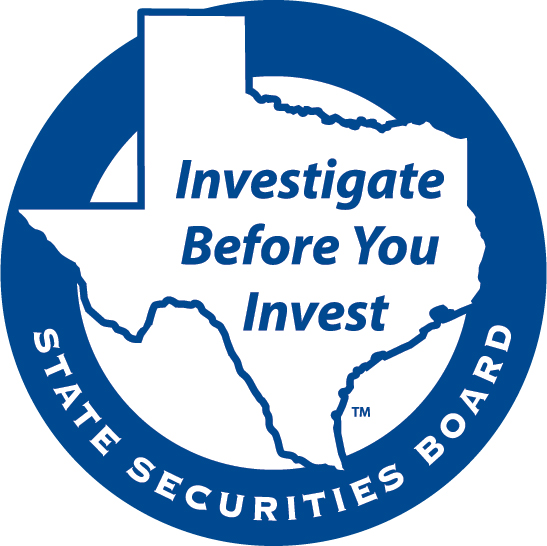 Certain types of investments—even if they are legitimate—should always raise red flags. If an investment seems exotic, promises large returns with minimal risk, or claims to be a “can’t miss,” consider just saying “No!”
Certain types of investments—even if they are legitimate—should always raise red flags. If an investment seems exotic, promises large returns with minimal risk, or claims to be a “can’t miss,” consider just saying “No!”
These investments are particularly tempting when yields on normally safer products, such as certificates of deposit and money market accounts, are low. This prompts investors to seek higher returns or alternative sources of income.
While some investments are outright frauds, others, like those described below, may be legitimate but highly inappropriate for many investors.
Unregistered Individuals
Plumbers must be licensed. The same with barbers, used auto-parts recyclers, and"booters," the companies that attach the boot that immobilizes your truck when you don’t pay your parking tickets.
Yet many investors don’t know that people and firms who sell securities must be registered with the Texas State Securities Board.
Generally, anyone acting as a sales agent for a company selling stocks, bonds, or other investments to the public must be registered to do so.
An investment promoter can’t simply set up a website or YouTube channel and sell investments unless the investments are registered or sold under one of the limited number of exemptions from registration.
Registering with the State Securities Board involves qualifications testing, background checks, and periodic review. To see if a person is registered to sell investments, visit Registration Checks or call (512) 305-8301. A sales agent who isn’t registered is likely violating the law.
Oil and Gas
Oil and gas investments are highly speculative and staggeringly complex to anyone not versed in the energy business.
Yet some investors, attracted by the mythology surrounding the oil industry, have a blind spot when approached to invest in the business.
It is difficult for a potential investor to investigate a promoter’s claims about how much oil or gas will be produced or the time it will take to start production. The structure of the investment will affect revenue and potential profits.
In addition, not all investors in oil and gas projects have the expertise to decipher geological maps, production reports, and filings with state energy regulators.
Investors should not rely solely on the promoter’s promises about any aspect of the investment. It’s also critical to know the background of the promoters – some may be inexperienced or have repeatedly failed in previous ventures, but have not disclosed those facts to investors.
Energy investments tend to be poor alternatives for those planning for retirement and should be avoided by anyone who cannot afford to strike out when trying to strike it rich.
Cyberattacks
The old saying about bank robbers – they go where the money is – applies to today’s cybercriminals.
Hackers are inundating investors and financial firms with phishing attacks, malware, and other types of online attacks to try to trick you or your firm into disclosing your brokerage account or bank information, passwords, Social Security Number, and other discrete information.
The techniques include using spam email and fake websites to convince investors they’re dealing with a legitimate firm. These illicit emails and websites appear authentic, and unsuspecting investors may either click on links that allow third-parties to steal their information or they may transfer funds to an account that appears to be maintained at their firm but in reality is controlled by a crook – often operating in anonymity, overseas, in a country that will not extradite criminals to Texas.
If you have any concerns about a website or email you have received from a financial institution, verify that it’s from a legitimate source.
Also, check your account statements and trade confirmations for any suspicious activity. If you find a discrepancy, put your questions to the firm in writing so you have a record of your complaint.
Currency trading
Currency exchange (forex) investing involves trading the currencies of other nations. Investors should keep in mind the enormous complexity of forex since it involves executing forex contracts in the currencies of dozens of countries with different political systems and economies.
Foreign currency is a vast global market where prices are volatile, and losses can pile up in a few hours. An individual is taking a huge risk by buying into an investment promoter’s promise that he can predict currency prices and lock in enormous profits with little or no risk.
Currency traders must be registered with one or more federal regulatory agencies and in most cases licensed by the Texas State Securities Board to sell investments based on forex trading.
Overseas Investments
International investments are often sold with the promise of profits to be made by selling much-needed products in untapped markets. But investors should ask themselves if they really understand how money will be made.
The State Securities Board has issued sanctions in cases involving real estate in France, medical testing kits in Southeast Asia, and bank deposits in West Africa and the Philippines.
How much could an individual investor possibly know about those investments? Too often, investors make decisions based solely on the profits they have been promised.
At the same time, there are mutual funds and ETFs that invest in international markets and stocks that are issued by corporations that are headquartered outside of the U.S. Some investment in international markets can be an important component of a diversified portfolio.
Promissory Notes and High-Yield Investment Programs
A promissory note is basically an IOU from a company or individual. The notes are sold to fund everything from property development to oil and gas exploration, or as a way to buy interests in a business partnership.
Sophisticated investors and corporations are likely to have the resources and expertise to evaluate the terms and conditions of promissory notes. Individual investors may not be able to accurately evaluate the creditworthiness or prospects of a project that is supposed to generate enough revenue to pay the promised return on the notes.
Private Placement Offerings
Companies use private placement offerings to raise capital without having to comply with the registration requirements of securities laws. These often have a limited operating history, and the investments themselves generally lack transparency.
In exchange for the exemption from registration, companies are allowed to raise money only from “accredited” investors—those having a net worth of $1 million, excluding the value of their primary residence, or annual income of $200,000 or more.
Investors should be careful they’re not putting money into an unlawful private placement or dealing with a promoter who isn’t verifying the accredited status of investors.
Real Estate
The promise of real estate investments is steady returns generated by the property or “hard asset” that promoters claim carry minimal risk.
In fact, real estate poses many risks, including the illiquid nature of the investment, the impact of interest rate changes, and potential effect of demographics, shift in property values, and changes in rental rates.
There are also risks with non-traded Real Estate Investment Trusts (REITs) that invest in large pieces of real estate such as hotels, hospitals, and shopping centers. Specifically, these investments are highly illiquid—they must be held for several years and are hard to redeem—and there are often substantial front-end fees that eat into any return.
